介词—语法知识梳理+专项集训及解析【中考英语 牛津深圳版】
文档属性
| 名称 | 介词—语法知识梳理+专项集训及解析【中考英语 牛津深圳版】 |
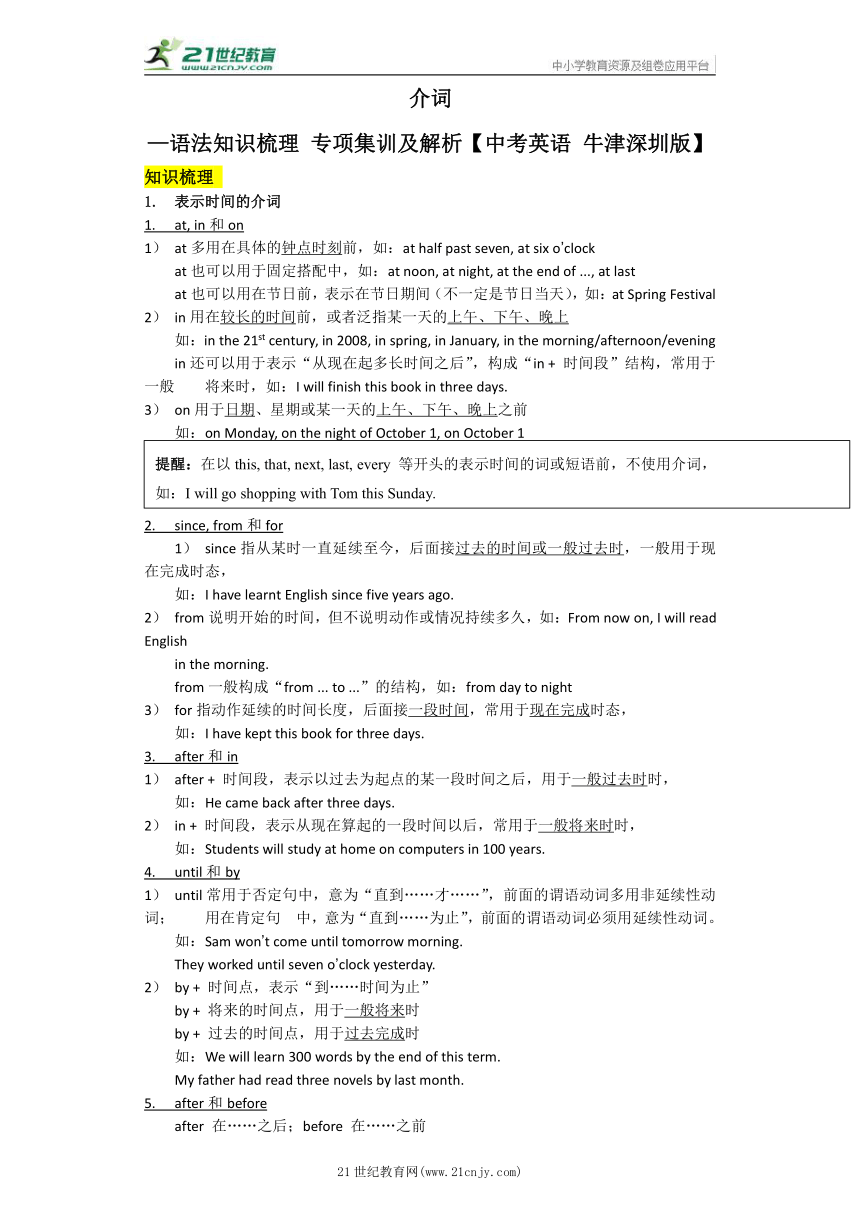
|
|
| 格式 | docx | ||
| 文件大小 | 56.9KB | ||
| 资源类型 | 试卷 | ||
| 版本资源 | 牛津深圳版 | ||
| 科目 | 英语 | ||
| 更新时间 | 2024-01-29 13:41:32 | ||
图片预览

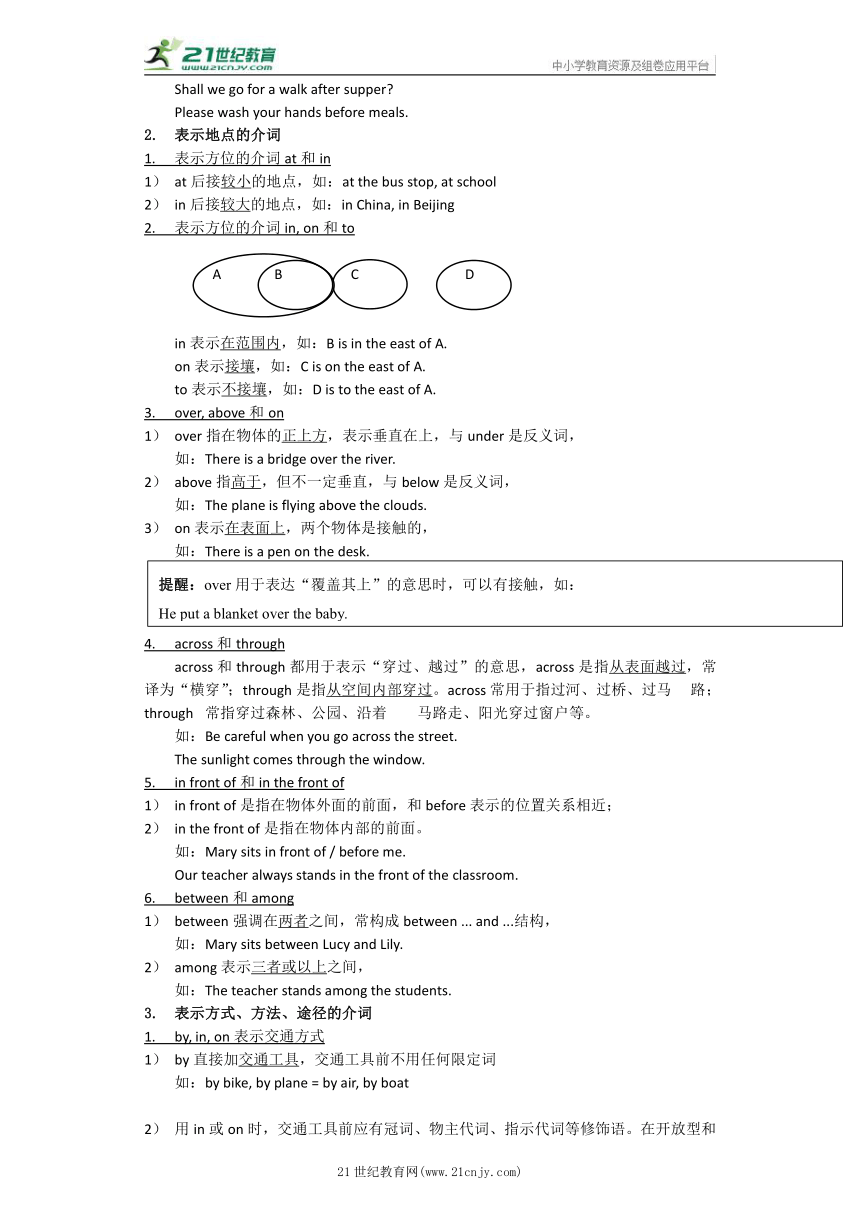
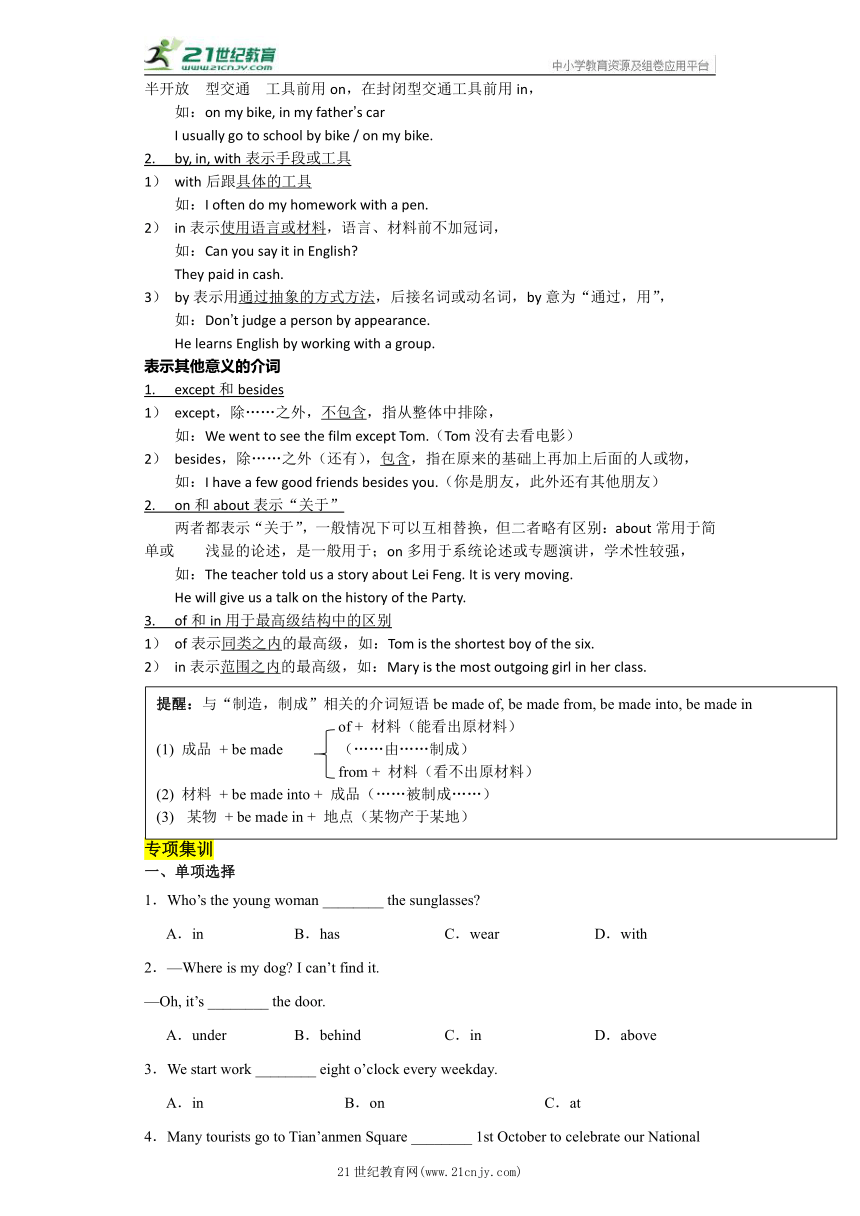
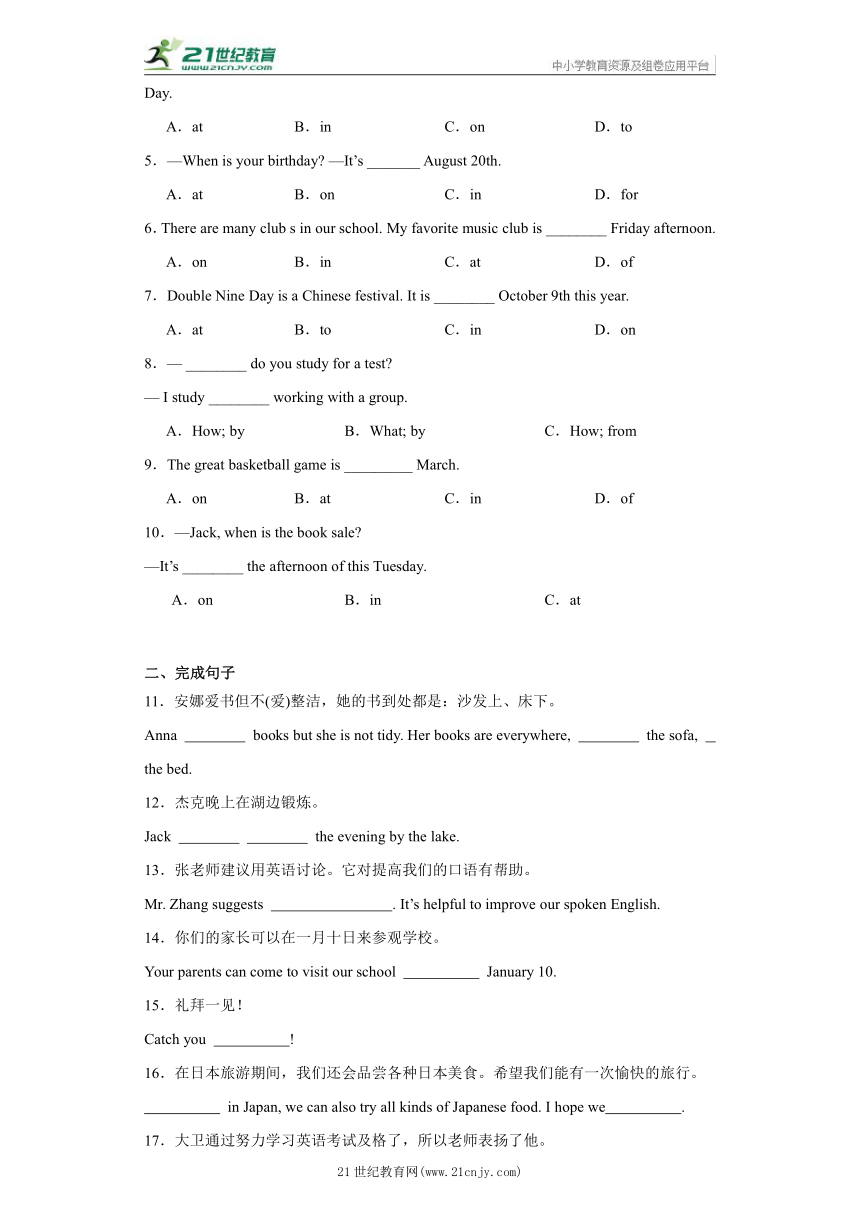
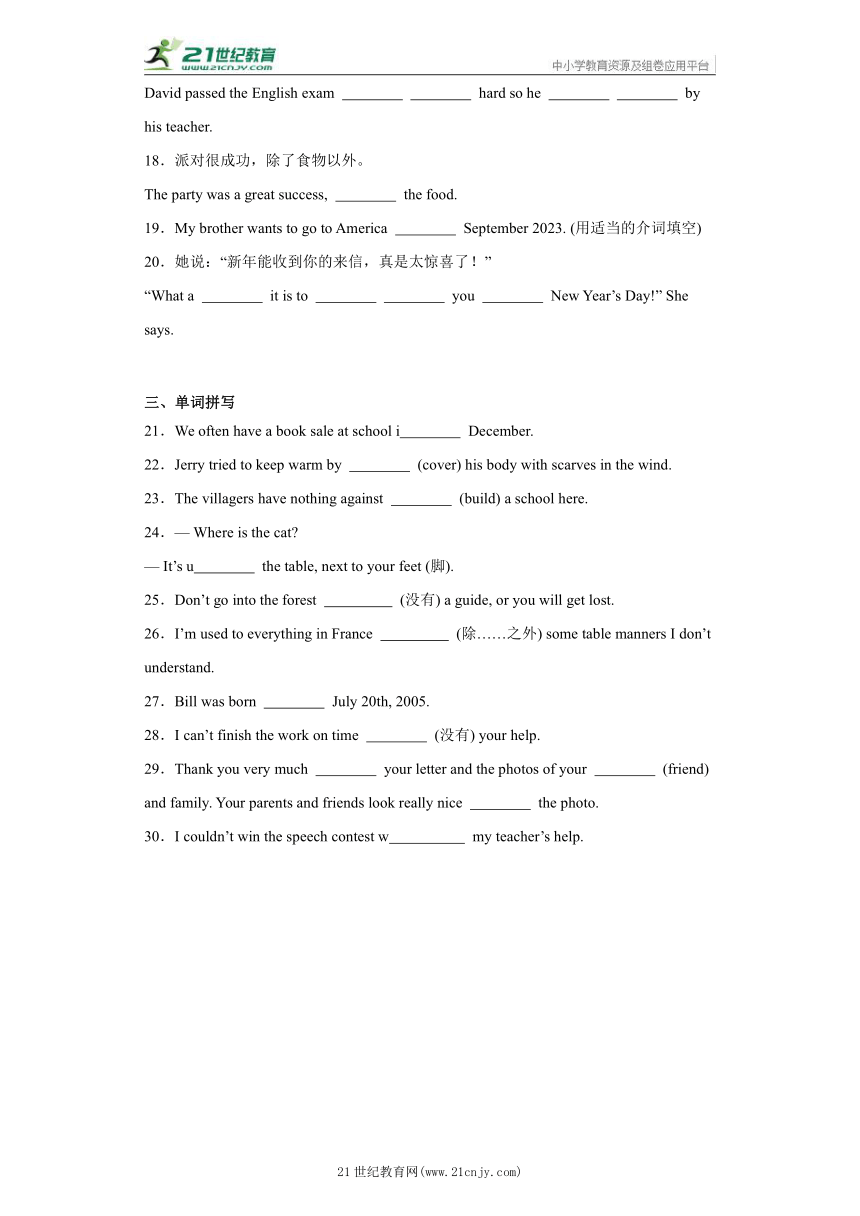
文档简介
介词
—语法知识梳理 专项集训及解析【中考英语 牛津深圳版】
知识梳理
1. 表示时间的介词
1. at, in和on
1) at多用在具体的钟点时刻前,如:at half past seven, at six o’clock
at也可以用于固定搭配中,如:at noon, at night, at the end of ..., at last
at也可以用在节日前,表示在节日期间(不一定是节日当天),如:at Spring Festival
2) in用在较长的时间前,或者泛指某一天的上午、下午、晚上
如:in the 21st century, in 2008, in spring, in January, in the morning/afternoon/evening
in还可以用于表示“从现在起多长时间之后”,构成“in + 时间段”结构,常用于一般 将来时,如:I will finish this book in three days.
3) on用于日期、星期或某一天的上午、下午、晚上之前
如:on Monday, on the night of October 1, on October 1
2. since, from和for
1) since指从某时一直延续至今,后面接过去的时间或一般过去时,一般用于现在完成时态,
如:I have learnt English since five years ago.
2) from说明开始的时间,但不说明动作或情况持续多久,如:From now on, I will read English
in the morning.
from一般构成“from ... to ...”的结构,如:from day to night
3) for指动作延续的时间长度,后面接一段时间,常用于现在完成时态,
如:I have kept this book for three days.
3. after和in
1) after + 时间段,表示以过去为起点的某一段时间之后,用于一般过去时时,
如:He came back after three days.
2) in + 时间段,表示从现在算起的一段时间以后,常用于一般将来时时,
如:Students will study at home on computers in 100 years.
4. until和by
1) until常用于否定句中,意为“直到……才……”,前面的谓语动词多用非延续性动词; 用在肯定句 中,意为“直到……为止”,前面的谓语动词必须用延续性动词。
如:Sam won’t come until tomorrow morning.
They worked until seven o’clock yesterday.
2) by + 时间点,表示“到……时间为止”
by + 将来的时间点,用于一般将来时
by + 过去的时间点,用于过去完成时
如:We will learn 300 words by the end of this term.
My father had read three novels by last month.
5. after和before
after 在……之后;before 在……之前
Shall we go for a walk after supper
Please wash your hands before meals.
2. 表示地点的介词
1. 表示方位的介词at和in
1) at后接较小的地点,如:at the bus stop, at school
2) in后接较大的地点,如:in China, in Beijing
2. 表示方位的介词in, on和to
A B C D
in表示在范围内,如:B is in the east of A.
on表示接壤,如:C is on the east of A.
to表示不接壤,如:D is to the east of A.
3. over, above和on
1) over指在物体的正上方,表示垂直在上,与under是反义词,
如:There is a bridge over the river.
2) above指高于,但不一定垂直,与below是反义词,
如:The plane is flying above the clouds.
3) on表示在表面上,两个物体是接触的,
如:There is a pen on the desk.
4. across和through
across和through都用于表示“穿过、越过”的意思,across是指从表面越过,常译为“横穿”;through 是指从空间内部穿过。across常用于指过河、过桥、过马 路;through 常指穿过森林、公园、沿着 马路走、阳光穿过窗户等。
如:Be careful when you go across the street.
The sunlight comes through the window.
5. in front of和in the front of
1) in front of是指在物体外面的前面,和before表示的位置关系相近;
2) in the front of是指在物体内部的前面。
如:Mary sits in front of / before me.
Our teacher always stands in the front of the classroom.
6. between和among
1) between强调在两者之间,常构成between ... and ...结构,
如:Mary sits between Lucy and Lily.
2) among表示三者或以上之间,
如:The teacher stands among the students.
3. 表示方式、方法、途径的介词
1. by, in, on表示交通方式
1) by直接加交通工具,交通工具前不用任何限定词
如:by bike, by plane = by air, by boat
2) 用in或on时,交通工具前应有冠词、物主代词、指示代词等修饰语。在开放型和半开放 型交通 工具前用on,在封闭型交通工具前用in,
如:on my bike, in my father’s car
I usually go to school by bike / on my bike.
2. by, in, with表示手段或工具
1) with后跟具体的工具
如:I often do my homework with a pen.
2) in表示使用语言或材料,语言、材料前不加冠词,
如:Can you say it in English
They paid in cash.
3) by表示用通过抽象的方式方法,后接名词或动名词,by意为“通过,用”,
如:Don’t judge a person by appearance.
He learns English by working with a group.
表示其他意义的介词
1. except和besides
1) except,除……之外,不包含,指从整体中排除,
如:We went to see the film except Tom.(Tom没有去看电影)
2) besides,除……之外(还有),包含,指在原来的基础上再加上后面的人或物,
如:I have a few good friends besides you.(你是朋友,此外还有其他朋友)
2. on和about表示“关于”
两者都表示“关于”,一般情况下可以互相替换,但二者略有区别:about常用于简单或 浅显的论述,是一般用于;on多用于系统论述或专题演讲,学术性较强,
如:The teacher told us a story about Lei Feng. It is very moving.
He will give us a talk on the history of the Party.
3. of和in用于最高级结构中的区别
1) of表示同类之内的最高级,如:Tom is the shortest boy of the six.
2) in表示范围之内的最高级,如:Mary is the most outgoing girl in her class.
专项集训
一、单项选择
1.Who’s the young woman ________ the sunglasses
A.in B.has C.wear D.with
2.—Where is my dog I can’t find it.
—Oh, it’s ________ the door.
A.under B.behind C.in D.above
3.We start work ________ eight o’clock every weekday.
A.in B.on C.at
4.Many tourists go to Tian’anmen Square ________ 1st October to celebrate our National Day.
A.at B.in C.on D.to
5.—When is your birthday —It’s _______ August 20th.
A.at B.on C.in D.for
6.There are many club s in our school. My favorite music club is ________ Friday afternoon.
A.on B.in C.at D.of
7.Double Nine Day is a Chinese festival. It is ________ October 9th this year.
A.at B.to C.in D.on
8.— ________ do you study for a test
— I study ________ working with a group.
A.How; by B.What; by C.How; from
9.The great basketball game is _________ March.
A.on B.at C.in D.of
10.—Jack, when is the book sale
—It’s ________ the afternoon of this Tuesday.
A.on B.in C.at
二、完成句子
11.安娜爱书但不(爱)整洁,她的书到处都是:沙发上、床下。
Anna books but she is not tidy. Her books are everywhere, the sofa, the bed.
12.杰克晚上在湖边锻炼。
Jack the evening by the lake.
13.张老师建议用英语讨论。它对提高我们的口语有帮助。
Mr. Zhang suggests . It’s helpful to improve our spoken English.
14.你们的家长可以在一月十日来参观学校。
Your parents can come to visit our school January 10.
15.礼拜一见!
Catch you !
16.在日本旅游期间,我们还会品尝各种日本美食。希望我们能有一次愉快的旅行。
in Japan, we can also try all kinds of Japanese food. I hope we .
17.大卫通过努力学习英语考试及格了,所以老师表扬了他。
David passed the English exam hard so he by his teacher.
18.派对很成功,除了食物以外。
The party was a great success, the food.
19.My brother wants to go to America September 2023. (用适当的介词填空)
20.她说:“新年能收到你的来信,真是太惊喜了!”
“What a it is to you New Year’s Day!” She says.
三、单词拼写
21.We often have a book sale at school i December.
22.Jerry tried to keep warm by (cover) his body with scarves in the wind.
23.The villagers have nothing against (build) a school here.
24.— Where is the cat
— It’s u the table, next to your feet (脚).
25.Don’t go into the forest (没有) a guide, or you will get lost.
26.I’m used to everything in France (除……之外) some table manners I don’t understand.
27.Bill was born July 20th, 2005.
28.I can’t finish the work on time (没有) your help.
29.Thank you very much your letter and the photos of your (friend) and family. Your parents and friends look really nice the photo.
30.I couldn’t win the speech contest w my teacher’s help.
21世纪教育网(www.21cnjy.com)
21世纪教育网(www.21cnjy.com)
参考答案:
1.D
【详解】句意:戴墨镜的年轻妇女是谁?
考查with用法。in穿着某种颜色的衣服;has有;wear穿,戴;with穿着,具有。根据“woman...the sunglasses”可知,此处表示“戴眼镜的妇女”。wear和with可表示穿戴,但wear是动词,在句中作谓语,此处是介词短语作定语修饰woman“女士”,故用介词with。故选D。
2.B
【详解】句意:——我的狗在哪里呢?我找不到它。——噢,它在门后面。
考查介词词义辨析。under在……下面;behind在……后面;in在……里面;above在……上面。由“I can’t find it.”可知,我找不到狗,它应该是“在门后面”。故选B。
3.C
【详解】句意:我们每个工作日八点开始工作。
考查介词辨析。in在某年某月某季节;on在某一天;at在某时刻。空后是具体时刻,用介词at。故选C。
4.C
【详解】句意:十月一日许多游客去天安门广场庆祝国庆节。
考查介词辨析。at用于具体的钟点前;in用于年、月、季节等泛指的时间前;on用于具体的某一天前,或具体某一天的上/下午/晚上前;to朝,向。根据“1st October”可知,是具体的某一天,用介词on。故选C。
5.B
【详解】句意:——你的生日是什么时候?——八月二十日。
考查时间介词。at用在时刻前;on用于具体某一天前;in用于年月季节等前;for后接一段时间。根据“August 20th”是具体某一天可知,时间介词用on。故选B。
6.A
【详解】句意:我们学校有很多俱乐部。我最喜欢的音乐俱乐部是星期五下午。
考查介词辨析。on用于表示确定的时间,具体某天或具体某一天的上午下午晚上或一般节日等;in用于表示世纪、年、月、季节,在上午/下午/晚上/白天等;at表示在具体的时间点,常用于表示钟点、夜里、中午、拂晓等的词组中;of属于……的。根据“Friday afternoon.”可知,这里用介词on。故选A。
7.D
【详解】句意:重阳节是中国的一个节日。今年是在10月9日这天。
考查介词辨析。at后接具体时刻;to到;in后接年/月/季节等;on后接具体某一天。根据“October 9th”可知,这里指具体的一天,用介词on。故选D。
8.A
【详解】句意:——你是怎样为考试而学习的?——我通过小组来学习。
考查特殊疑问词和介词辨析。how怎样,提问方式;what什么,询问人或事;by通过……方法或手段;from来自。根据“I study...working with a group.”可知,回答学习方式,第一,应用特殊疑问词how;第二空,应用“by doing”结构,表达方式。故选A。
9.C
【详解】句意:盛大的篮球赛在三月举行。
考查介词辨析。on后加具体的某一天;at后加具体的时刻;in后加某年某月某季节;of……的。根据“March”可知,应用介词in。故选C。
10.A
【详解】句意:——杰克,图书销售是在什么时候?——是在这个星期二的下午。
考查介词辨析。on用于具体某一天或具体某一天的上午、下午或晚上;in用在年、月、季节前;at用于具体的时刻前。根据“the afternoon of this Tuesday”可知,是指在这个星期二的下午,应用介词on,故选A。
11. loves/likes on under
【详解】love/like表示“喜欢”,句子是一般现在时,主语是第三人称单数,动词用三单形式。on“在……上”,under“在……下”。故填loves/likes;on;under。
12. exercises in
【详解】exercise“锻炼”,动词;in the evening“晚上”,时间状语。根据中文语境可知,本句时态为一般现在时,主语Jack为第三人称单数,动词exercise应用三单形式。故填exercises;in。
13.discussing in English
【详解】对比所给中英文可知,设空处为“用英语讨论”,discuss in English意为“用英语讨论”符合;suggest doing sth.“建议做某事”,固定短语,所以此处应填discussing in English。故填discussing in English。
14.on
【详解】表示在几月几号用介词on。故填on。
15.on Monday
【详解】“礼拜一”Monday,星期前要加时间介词on。故填on Monday。
16. During our trip can have a good time
【详解】结合中英文,空一填“在旅游期间”,其英文表达是“During our trip”;空二填“能有一次愉快的旅行”,根据动词“hope”形式可知,此句时态为一般现在时,故可以表达为“can have a good time”。故填During our trip;can have a good time。
17. by working/studying was praised
【详解】“通过”by;“学习”work/study,by后接其动名词形式;“表扬”praise,主语“he”与动词praise之间是动宾关系,结合“passed”可知用一般过去时的被动语态,he后用was。故填by;working/studying;was;praised。
18.except for
【详解】结合中英文,此处是表示除了食物以外,不包括食物;the party与the food之间是整体与部分的关系,应用except for“除了”,介词。故填except for。
19.in
【详解】句意:我的弟弟2023年9月份想去美国。空格后面是September“9月”,在月份前面通常用介词in。故填in。
20. surprise hear from on
【详解】分析句子结构可知,句子为what引导的感叹句,结构是What a/an +名词+主谓;surprise“惊讶,惊喜”,可数名词, what a surprise“多么惊喜,太惊喜了”;hear from sb.“收到某人的来信”,动词短语,用于it is to之后,接动词原形;on用于节日名词前,on New Year’s Day在新年。故填surprise;hear;from;on。
21.(i)n
【详解】句意:我们学校在12月经常有图书销售。根据“December”可知,月份前需要时间介词in。故填(i)n。
22.covering
【详解】句意:Jerry在风中用围巾把身体包住来保持温暖。根据句意及“by”可知,by表方式,其后跟动词ing,故填cover的现在分词covering。故填covering。
23.building
【详解】句意:村民们并不反对在这里建一所学校。此空前是介词against,后接动名词building,故填building。
24.(u)nder
【详解】句意:——猫在哪里?——它在桌子下面,你脚的旁边。根据“It’s…the table, next to your feet (脚).”以及首字母提示可知,此处表示猫在桌子下面,因此应用介词under,意为“在……下面”。故填(u)nder。
25.without
【详解】句意:没有导游就不要进森林,否则你会迷路的。没有:without,介词。故填without。
26.except
【详解】句意:除了一些我不懂的餐桌礼仪,我已经习惯了法国的一切。根据“some table manners I don’t understand”可知此处应用介词except表示“除……之外”。故填except。
27.on
【详解】句意:比尔出生于2005年7月20日。根据“July 20th, 2005.”可知是具体的一天,此处应使用时间介词on。故填on。
28.without
【详解】句意:如果没有你的帮助,我不能按时完成工作。“没有”without,介词。故填without。
29. for friends in
【详解】句意:非常感谢你的来信和你的全家福。在这张照片里,你的父母和朋友看起来真的很漂亮。第一空考查固定搭配:thank you for sth.因某物而感谢某人,因此填for。第二空考查可数名词的复数,根据“Your parents and friends”可知,这里照片里的朋友不止一个,因此填friends。第三空考查介词,in the photo“在照片里”,因此填in。故填for;friends;in。
30.(w)ithout
【详解】句意:没有我老师的帮助,我不会赢得演讲比赛。根据“my teacher’s help.”及首字母提示可知没有老师的帮助就不可能赢得比赛,需填介词“没有”对应的英文without,此处是介词短语作状语,故填(w)ithout。
21世纪教育网(www.21cnjy.com)
21世纪教育网(www.21cnjy.com)
—语法知识梳理 专项集训及解析【中考英语 牛津深圳版】
知识梳理
1. 表示时间的介词
1. at, in和on
1) at多用在具体的钟点时刻前,如:at half past seven, at six o’clock
at也可以用于固定搭配中,如:at noon, at night, at the end of ..., at last
at也可以用在节日前,表示在节日期间(不一定是节日当天),如:at Spring Festival
2) in用在较长的时间前,或者泛指某一天的上午、下午、晚上
如:in the 21st century, in 2008, in spring, in January, in the morning/afternoon/evening
in还可以用于表示“从现在起多长时间之后”,构成“in + 时间段”结构,常用于一般 将来时,如:I will finish this book in three days.
3) on用于日期、星期或某一天的上午、下午、晚上之前
如:on Monday, on the night of October 1, on October 1
2. since, from和for
1) since指从某时一直延续至今,后面接过去的时间或一般过去时,一般用于现在完成时态,
如:I have learnt English since five years ago.
2) from说明开始的时间,但不说明动作或情况持续多久,如:From now on, I will read English
in the morning.
from一般构成“from ... to ...”的结构,如:from day to night
3) for指动作延续的时间长度,后面接一段时间,常用于现在完成时态,
如:I have kept this book for three days.
3. after和in
1) after + 时间段,表示以过去为起点的某一段时间之后,用于一般过去时时,
如:He came back after three days.
2) in + 时间段,表示从现在算起的一段时间以后,常用于一般将来时时,
如:Students will study at home on computers in 100 years.
4. until和by
1) until常用于否定句中,意为“直到……才……”,前面的谓语动词多用非延续性动词; 用在肯定句 中,意为“直到……为止”,前面的谓语动词必须用延续性动词。
如:Sam won’t come until tomorrow morning.
They worked until seven o’clock yesterday.
2) by + 时间点,表示“到……时间为止”
by + 将来的时间点,用于一般将来时
by + 过去的时间点,用于过去完成时
如:We will learn 300 words by the end of this term.
My father had read three novels by last month.
5. after和before
after 在……之后;before 在……之前
Shall we go for a walk after supper
Please wash your hands before meals.
2. 表示地点的介词
1. 表示方位的介词at和in
1) at后接较小的地点,如:at the bus stop, at school
2) in后接较大的地点,如:in China, in Beijing
2. 表示方位的介词in, on和to
A B C D
in表示在范围内,如:B is in the east of A.
on表示接壤,如:C is on the east of A.
to表示不接壤,如:D is to the east of A.
3. over, above和on
1) over指在物体的正上方,表示垂直在上,与under是反义词,
如:There is a bridge over the river.
2) above指高于,但不一定垂直,与below是反义词,
如:The plane is flying above the clouds.
3) on表示在表面上,两个物体是接触的,
如:There is a pen on the desk.
4. across和through
across和through都用于表示“穿过、越过”的意思,across是指从表面越过,常译为“横穿”;through 是指从空间内部穿过。across常用于指过河、过桥、过马 路;through 常指穿过森林、公园、沿着 马路走、阳光穿过窗户等。
如:Be careful when you go across the street.
The sunlight comes through the window.
5. in front of和in the front of
1) in front of是指在物体外面的前面,和before表示的位置关系相近;
2) in the front of是指在物体内部的前面。
如:Mary sits in front of / before me.
Our teacher always stands in the front of the classroom.
6. between和among
1) between强调在两者之间,常构成between ... and ...结构,
如:Mary sits between Lucy and Lily.
2) among表示三者或以上之间,
如:The teacher stands among the students.
3. 表示方式、方法、途径的介词
1. by, in, on表示交通方式
1) by直接加交通工具,交通工具前不用任何限定词
如:by bike, by plane = by air, by boat
2) 用in或on时,交通工具前应有冠词、物主代词、指示代词等修饰语。在开放型和半开放 型交通 工具前用on,在封闭型交通工具前用in,
如:on my bike, in my father’s car
I usually go to school by bike / on my bike.
2. by, in, with表示手段或工具
1) with后跟具体的工具
如:I often do my homework with a pen.
2) in表示使用语言或材料,语言、材料前不加冠词,
如:Can you say it in English
They paid in cash.
3) by表示用通过抽象的方式方法,后接名词或动名词,by意为“通过,用”,
如:Don’t judge a person by appearance.
He learns English by working with a group.
表示其他意义的介词
1. except和besides
1) except,除……之外,不包含,指从整体中排除,
如:We went to see the film except Tom.(Tom没有去看电影)
2) besides,除……之外(还有),包含,指在原来的基础上再加上后面的人或物,
如:I have a few good friends besides you.(你是朋友,此外还有其他朋友)
2. on和about表示“关于”
两者都表示“关于”,一般情况下可以互相替换,但二者略有区别:about常用于简单或 浅显的论述,是一般用于;on多用于系统论述或专题演讲,学术性较强,
如:The teacher told us a story about Lei Feng. It is very moving.
He will give us a talk on the history of the Party.
3. of和in用于最高级结构中的区别
1) of表示同类之内的最高级,如:Tom is the shortest boy of the six.
2) in表示范围之内的最高级,如:Mary is the most outgoing girl in her class.
专项集训
一、单项选择
1.Who’s the young woman ________ the sunglasses
A.in B.has C.wear D.with
2.—Where is my dog I can’t find it.
—Oh, it’s ________ the door.
A.under B.behind C.in D.above
3.We start work ________ eight o’clock every weekday.
A.in B.on C.at
4.Many tourists go to Tian’anmen Square ________ 1st October to celebrate our National Day.
A.at B.in C.on D.to
5.—When is your birthday —It’s _______ August 20th.
A.at B.on C.in D.for
6.There are many club s in our school. My favorite music club is ________ Friday afternoon.
A.on B.in C.at D.of
7.Double Nine Day is a Chinese festival. It is ________ October 9th this year.
A.at B.to C.in D.on
8.— ________ do you study for a test
— I study ________ working with a group.
A.How; by B.What; by C.How; from
9.The great basketball game is _________ March.
A.on B.at C.in D.of
10.—Jack, when is the book sale
—It’s ________ the afternoon of this Tuesday.
A.on B.in C.at
二、完成句子
11.安娜爱书但不(爱)整洁,她的书到处都是:沙发上、床下。
Anna books but she is not tidy. Her books are everywhere, the sofa, the bed.
12.杰克晚上在湖边锻炼。
Jack the evening by the lake.
13.张老师建议用英语讨论。它对提高我们的口语有帮助。
Mr. Zhang suggests . It’s helpful to improve our spoken English.
14.你们的家长可以在一月十日来参观学校。
Your parents can come to visit our school January 10.
15.礼拜一见!
Catch you !
16.在日本旅游期间,我们还会品尝各种日本美食。希望我们能有一次愉快的旅行。
in Japan, we can also try all kinds of Japanese food. I hope we .
17.大卫通过努力学习英语考试及格了,所以老师表扬了他。
David passed the English exam hard so he by his teacher.
18.派对很成功,除了食物以外。
The party was a great success, the food.
19.My brother wants to go to America September 2023. (用适当的介词填空)
20.她说:“新年能收到你的来信,真是太惊喜了!”
“What a it is to you New Year’s Day!” She says.
三、单词拼写
21.We often have a book sale at school i December.
22.Jerry tried to keep warm by (cover) his body with scarves in the wind.
23.The villagers have nothing against (build) a school here.
24.— Where is the cat
— It’s u the table, next to your feet (脚).
25.Don’t go into the forest (没有) a guide, or you will get lost.
26.I’m used to everything in France (除……之外) some table manners I don’t understand.
27.Bill was born July 20th, 2005.
28.I can’t finish the work on time (没有) your help.
29.Thank you very much your letter and the photos of your (friend) and family. Your parents and friends look really nice the photo.
30.I couldn’t win the speech contest w my teacher’s help.
21世纪教育网(www.21cnjy.com)
21世纪教育网(www.21cnjy.com)
参考答案:
1.D
【详解】句意:戴墨镜的年轻妇女是谁?
考查with用法。in穿着某种颜色的衣服;has有;wear穿,戴;with穿着,具有。根据“woman...the sunglasses”可知,此处表示“戴眼镜的妇女”。wear和with可表示穿戴,但wear是动词,在句中作谓语,此处是介词短语作定语修饰woman“女士”,故用介词with。故选D。
2.B
【详解】句意:——我的狗在哪里呢?我找不到它。——噢,它在门后面。
考查介词词义辨析。under在……下面;behind在……后面;in在……里面;above在……上面。由“I can’t find it.”可知,我找不到狗,它应该是“在门后面”。故选B。
3.C
【详解】句意:我们每个工作日八点开始工作。
考查介词辨析。in在某年某月某季节;on在某一天;at在某时刻。空后是具体时刻,用介词at。故选C。
4.C
【详解】句意:十月一日许多游客去天安门广场庆祝国庆节。
考查介词辨析。at用于具体的钟点前;in用于年、月、季节等泛指的时间前;on用于具体的某一天前,或具体某一天的上/下午/晚上前;to朝,向。根据“1st October”可知,是具体的某一天,用介词on。故选C。
5.B
【详解】句意:——你的生日是什么时候?——八月二十日。
考查时间介词。at用在时刻前;on用于具体某一天前;in用于年月季节等前;for后接一段时间。根据“August 20th”是具体某一天可知,时间介词用on。故选B。
6.A
【详解】句意:我们学校有很多俱乐部。我最喜欢的音乐俱乐部是星期五下午。
考查介词辨析。on用于表示确定的时间,具体某天或具体某一天的上午下午晚上或一般节日等;in用于表示世纪、年、月、季节,在上午/下午/晚上/白天等;at表示在具体的时间点,常用于表示钟点、夜里、中午、拂晓等的词组中;of属于……的。根据“Friday afternoon.”可知,这里用介词on。故选A。
7.D
【详解】句意:重阳节是中国的一个节日。今年是在10月9日这天。
考查介词辨析。at后接具体时刻;to到;in后接年/月/季节等;on后接具体某一天。根据“October 9th”可知,这里指具体的一天,用介词on。故选D。
8.A
【详解】句意:——你是怎样为考试而学习的?——我通过小组来学习。
考查特殊疑问词和介词辨析。how怎样,提问方式;what什么,询问人或事;by通过……方法或手段;from来自。根据“I study...working with a group.”可知,回答学习方式,第一,应用特殊疑问词how;第二空,应用“by doing”结构,表达方式。故选A。
9.C
【详解】句意:盛大的篮球赛在三月举行。
考查介词辨析。on后加具体的某一天;at后加具体的时刻;in后加某年某月某季节;of……的。根据“March”可知,应用介词in。故选C。
10.A
【详解】句意:——杰克,图书销售是在什么时候?——是在这个星期二的下午。
考查介词辨析。on用于具体某一天或具体某一天的上午、下午或晚上;in用在年、月、季节前;at用于具体的时刻前。根据“the afternoon of this Tuesday”可知,是指在这个星期二的下午,应用介词on,故选A。
11. loves/likes on under
【详解】love/like表示“喜欢”,句子是一般现在时,主语是第三人称单数,动词用三单形式。on“在……上”,under“在……下”。故填loves/likes;on;under。
12. exercises in
【详解】exercise“锻炼”,动词;in the evening“晚上”,时间状语。根据中文语境可知,本句时态为一般现在时,主语Jack为第三人称单数,动词exercise应用三单形式。故填exercises;in。
13.discussing in English
【详解】对比所给中英文可知,设空处为“用英语讨论”,discuss in English意为“用英语讨论”符合;suggest doing sth.“建议做某事”,固定短语,所以此处应填discussing in English。故填discussing in English。
14.on
【详解】表示在几月几号用介词on。故填on。
15.on Monday
【详解】“礼拜一”Monday,星期前要加时间介词on。故填on Monday。
16. During our trip can have a good time
【详解】结合中英文,空一填“在旅游期间”,其英文表达是“During our trip”;空二填“能有一次愉快的旅行”,根据动词“hope”形式可知,此句时态为一般现在时,故可以表达为“can have a good time”。故填During our trip;can have a good time。
17. by working/studying was praised
【详解】“通过”by;“学习”work/study,by后接其动名词形式;“表扬”praise,主语“he”与动词praise之间是动宾关系,结合“passed”可知用一般过去时的被动语态,he后用was。故填by;working/studying;was;praised。
18.except for
【详解】结合中英文,此处是表示除了食物以外,不包括食物;the party与the food之间是整体与部分的关系,应用except for“除了”,介词。故填except for。
19.in
【详解】句意:我的弟弟2023年9月份想去美国。空格后面是September“9月”,在月份前面通常用介词in。故填in。
20. surprise hear from on
【详解】分析句子结构可知,句子为what引导的感叹句,结构是What a/an +名词+主谓;surprise“惊讶,惊喜”,可数名词, what a surprise“多么惊喜,太惊喜了”;hear from sb.“收到某人的来信”,动词短语,用于it is to之后,接动词原形;on用于节日名词前,on New Year’s Day在新年。故填surprise;hear;from;on。
21.(i)n
【详解】句意:我们学校在12月经常有图书销售。根据“December”可知,月份前需要时间介词in。故填(i)n。
22.covering
【详解】句意:Jerry在风中用围巾把身体包住来保持温暖。根据句意及“by”可知,by表方式,其后跟动词ing,故填cover的现在分词covering。故填covering。
23.building
【详解】句意:村民们并不反对在这里建一所学校。此空前是介词against,后接动名词building,故填building。
24.(u)nder
【详解】句意:——猫在哪里?——它在桌子下面,你脚的旁边。根据“It’s…the table, next to your feet (脚).”以及首字母提示可知,此处表示猫在桌子下面,因此应用介词under,意为“在……下面”。故填(u)nder。
25.without
【详解】句意:没有导游就不要进森林,否则你会迷路的。没有:without,介词。故填without。
26.except
【详解】句意:除了一些我不懂的餐桌礼仪,我已经习惯了法国的一切。根据“some table manners I don’t understand”可知此处应用介词except表示“除……之外”。故填except。
27.on
【详解】句意:比尔出生于2005年7月20日。根据“July 20th, 2005.”可知是具体的一天,此处应使用时间介词on。故填on。
28.without
【详解】句意:如果没有你的帮助,我不能按时完成工作。“没有”without,介词。故填without。
29. for friends in
【详解】句意:非常感谢你的来信和你的全家福。在这张照片里,你的父母和朋友看起来真的很漂亮。第一空考查固定搭配:thank you for sth.因某物而感谢某人,因此填for。第二空考查可数名词的复数,根据“Your parents and friends”可知,这里照片里的朋友不止一个,因此填friends。第三空考查介词,in the photo“在照片里”,因此填in。故填for;friends;in。
30.(w)ithout
【详解】句意:没有我老师的帮助,我不会赢得演讲比赛。根据“my teacher’s help.”及首字母提示可知没有老师的帮助就不可能赢得比赛,需填介词“没有”对应的英文without,此处是介词短语作状语,故填(w)ithout。
21世纪教育网(www.21cnjy.com)
21世纪教育网(www.21cnjy.com)
同课章节目录
- 词法
- 名词
- 动词和动词短语
- 动词语态
- 动词时态
- 助动词和情态动词
- 非谓语动词
- 冠词
- 代词
- 数词和量词
- 形容词副词及其比较等级
- 介词和介词短语
- 连词和感叹词
- 构词法
- 相似、相近词比较
- 句法
- 陈述句
- 一般疑问句和否定疑问句
- 特殊疑问句及选择疑问句
- 反意疑问句
- 存在句(There be句型)
- 宾语从句
- 定语从句
- 状语从句
- 主谓一致问题
- 简单句
- 并列句
- 复合句
- 主谓一致
- 主、表语从句
- 名词性从句
- 直接引语和间接引语
- 虚拟语气
- 感叹句
- 强调句
- 倒装句
- 祈使句
- 句子的成分
- 句子的分类
- 题型专区
- 单项选择部分
- 易错题
- 完形填空
- 阅读理解
- 词汇练习
- 听说训练
- 句型转换
- 补全对话
- 短文改错
- 翻译
- 书面表达
- 任务型阅读
- 语法填空
- 其他资料
